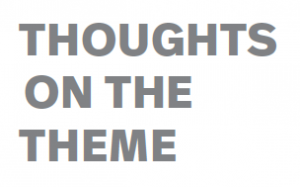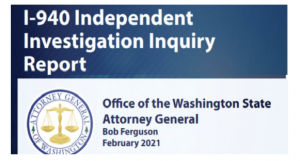There’s a lot of talk these days about how polarized “the country” is. The talk fixates on Trump voters vs everyone else, or Democrats vs Republicans or liberals vs conservatives.
everyone else, or Democrats vs Republicans or liberals vs conservatives.
When we at WIP began thinking about polarization, two things came up. First, consider that the two parties promote the “Trump v everyone, libs v conservatives” idea of “polarization” as an electoral strategy. We think the explanation for the country’s division lies in the effects of racism and inequality.
Second, we thought it better to pose the question of division from the opposite side: finding common ground.
Racism
Eleanor Steinhagen’s article argues that our Sheriff’s support for white supremacy undermines trust in the practices of law enforcement. A second review of Caste lays bare the legal and structural mechanisms that divide us along racial lines.
There are signs of hope, though. On page 4, there is a reflection on local actions stemming from the new awareness of the effects of racism triggered by the police killing of George Floyd. An article about the search for a new chief of the Olympia Police Department acknowledges small steps toward involving the community in defining what is needed. Bill Fishburn describes the way racism divides us but then embarks on an effort to bring people together: something as basic as serving beer.
Inequality
The United States is a country of staggering disparities and we tried to show a bit of that on page 6.
There is a graphic illustration of how little common ground there is in the way we treat those who are responsible for providing services absolutely essential to the health of our community.
To become employed as a teacher or a nurse you must first invest thousands for training, be tested and certified — and be paid at a modest level at entry. Throughout your career you must demonstrate continued ability to meet standards to keep your certification.
To become employed as a police officer you only need to be a high school graduate (or have a GED), pass a test and be eligible to possess a firearm. That qualifies you for an entry-level salary above the median household income in Thurston County. And while a police officer attends training as part of their job, no state law sets milestones for them to meet throughout their career and they don’t need to do anything to maintain their certification.
As for how we meet the requirement to house people — we leave that to individuals whose only qualification is money, and who are able to compensate themselves in the hundreds of thousands.
Common ground
It turns out that the space for common ground is small when the public sector is ravaged and essential needs of society are privatized. Privatization puts a price on everything so that those who have money can avail themselves of the essential services; and those who do not cannot.
Can there be “common ground” when there is no public sector? As the stories about Mutual Aid and raising food communally show, creating common ground becomes the task of individuals grouping together to provide for community needs. These stories highlight the many positive aspects to this—ingenuity, commitment, satisfactions of working together to do something important. But these kinds of arrangements are not sustainable in the long run. There aren’t enough people with time to work for free month after month and year after year. This is confirmed by the continuous and urgent pleas for volunteers that you can find all over the internet (and in this paper).
We need a healthy well-funded public sector that supplies essential public needs. We need governments at all levels that work for the people.
—BW
Upcoming themes
- June — The big lie. Deadline May 15.
- July — The ballot or the bullet. Deadline June 15.
Common ground ? Where?
The middle is a point equidistant from two poles. That’s it. There is nothing inherently virtuous about being neither here nor there. Buried in this is a false equivalency of ideas, what you might call the “good people on both sides’’ phenomenon. When we revisit our shameful past, ask yourself, Where was the middle? Rather than chattel slavery, perhaps we could agree on a nice program of indentured servitude? Instead of subjecting Japanese-American citizens to indefinite detention during WWII, what if we had agreed to give them actual sentences and perhaps provided a receipt for them to reclaim their things when they were released? What is halfway between moral and immoral?
This paragraph appeared in an essay by Tayari Jones in the November 5, 2018 issue of TIME. Jones is a professor at Emory University and the author of three novels.

Be First to Comment